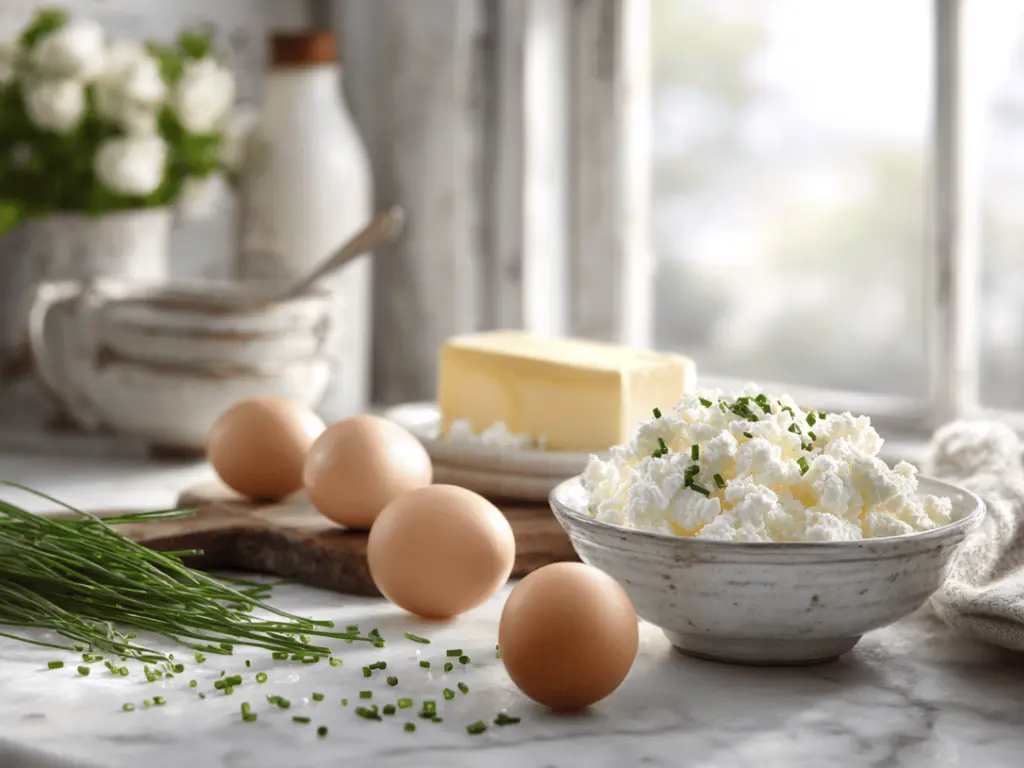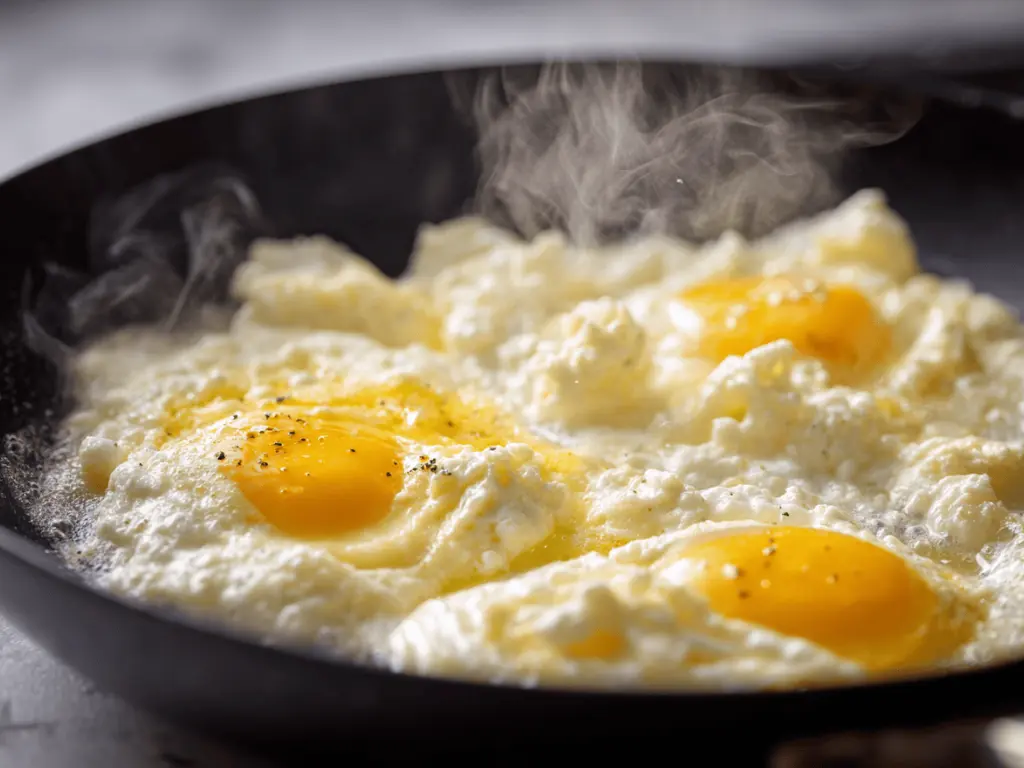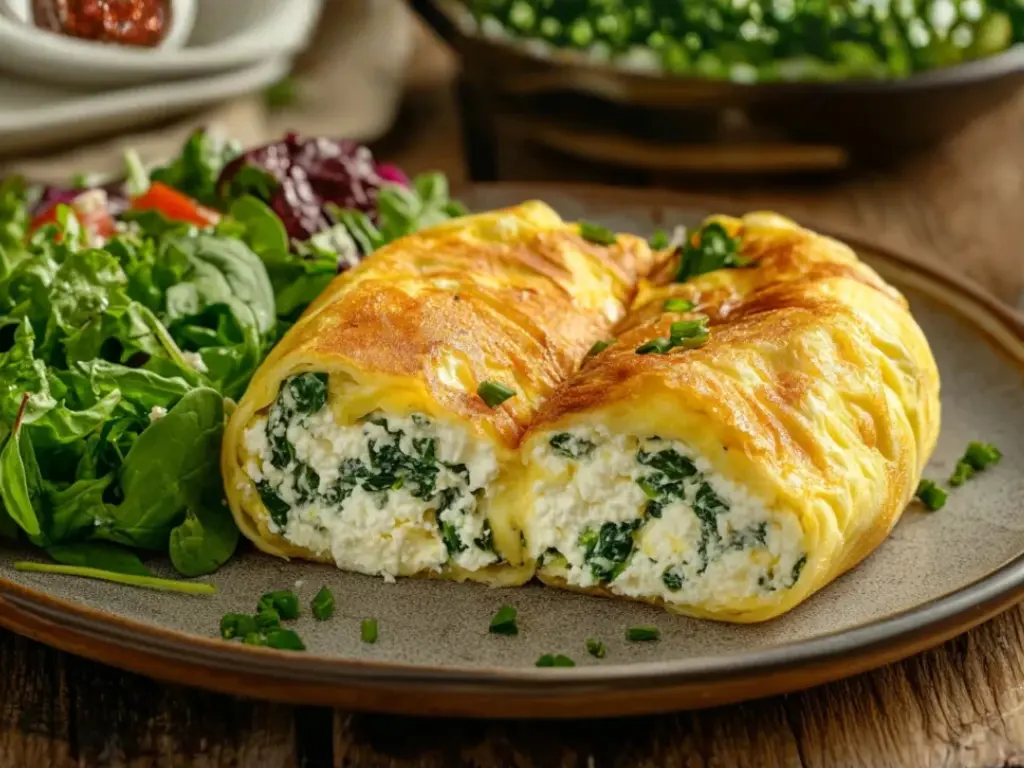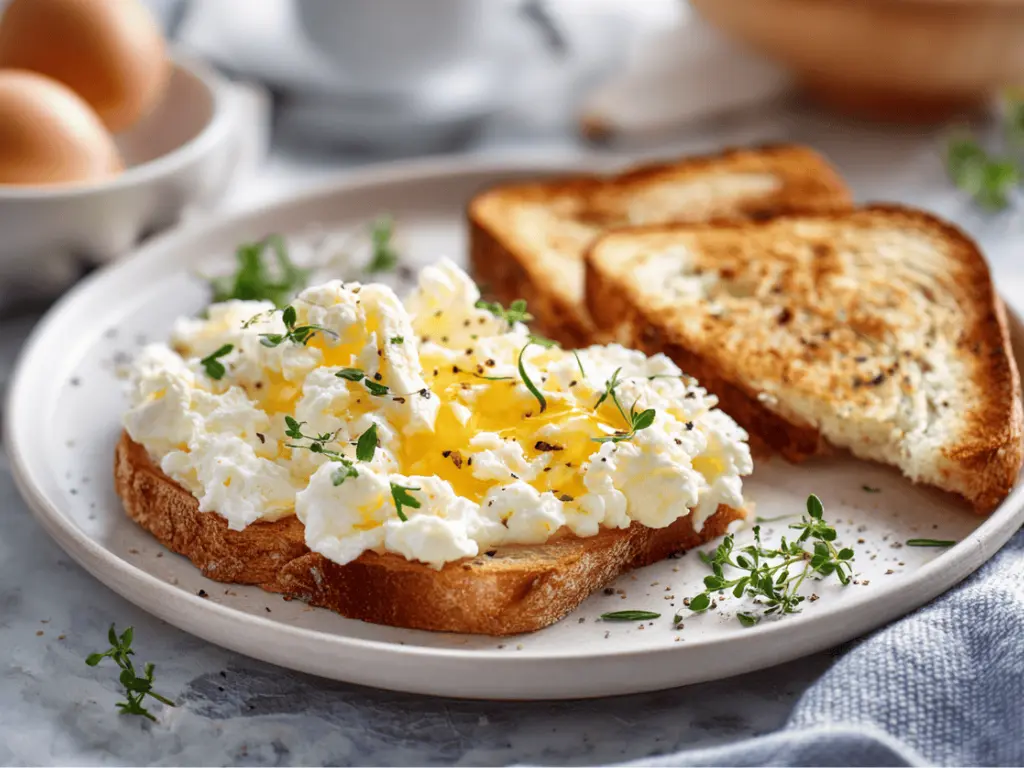Cottage cheese eggs are my secret to transforming an ordinary breakfast into something creamy, satisfying, and surprisingly light. Growing up in a big Southern family, weekends meant sizzling skillets, laughter, and the smell of eggs on the stove. One morning, I stirred a spoonful of cottage cheese into the bowl, and everything changed. The eggs turned luxuriously fluffy, almost like a chef’s scramble, but with a gentle tang that balanced the richness.
This simple pairing brings together two protein powerhouses, making each bite both comforting and nourishing. Unlike heavy cream or milk, cottage cheese adds creaminess and extra protein without the guilt, turning your plate into a high protein breakfast that fuels your day. Whether you crave something quick before work or a relaxed brunch dish, this guide shows how to cook, bake, and flavor your eggs for the perfect texture and taste.
Next, we’ll gather the ingredients and substitutions you can tailor to your own kitchen.
Ingredients and Substitutions

Before you start cooking, gather everything that makes cottage cheese eggs smooth, creamy, and rich in protein. This list works for both scrambled and baked versions.
Core Ingredients
- 4 large eggs, the base of your dish, packed with high quality protein.
- ½ cup cottage cheese, use small curd for a smoother texture or large curd for more bite.
- 1 tablespoon butter, adds flavor and prevents sticking in the pan.
- Salt and black pepper, to taste.
- 1 tablespoon chopped chives, for a light onion note and color.
Optional Mix ins
- ¼ cup diced vegetables, spinach, bell pepper, or mushrooms add nutrients and texture.
- 2 tablespoons shredded cheddar or feta, deepens flavor.
- Pinch of smoked paprika or garlic powder, enhances aroma.
Substitutions
- Lower fat option: choose low fat or whipped cottage cheese instead of full fat for fewer calories.
- Lactose friendly: use lactose free cottage cheese or replace butter with olive oil.
- Vegetarian meal prep: perfect as is, pair with vegetables or whole grains for balance.
- Extra creamy texture: blend the cottage cheese before mixing it with eggs for a smooth custard like result.
Equipment
A nonstick skillet, whisk, spatula, and baking dish for egg bake ensure effortless cooking and easy cleanup.
With ingredients ready, move into the simple methods for making these scrambled eggs with cottage cheese creamy and flavorful.
Step by Step Instructions

Cooking cottage cheese eggs feels simple once you slow down and trust the process. The combination rewards patience with a smooth, delicate texture. You can prepare it in a pan for a creamy fold or bake it for a soft, custard-like slice.
Scrambled Method
- Crack fresh eggs into a mixing bowl. Spoon in cottage cheese and whisk until the color turns pale and even. A few small curds should remain for body and flavor.
- Place a skillet on gentle heat and melt a bit of butter. The butter should foam quietly, not sizzle.
- Pour in the mixture and begin stirring with slow, steady motions. Use the edge of a spatula to guide the liquid toward the center.
- As the texture thickens, keep the heat low. The curds will form slowly and stay moist. Stop before the eggs look dry.
- Finish with salt, pepper, and herbs. Remove the pan from the stove while the eggs still shine. Carryover heat will complete the cook.
- This relaxed approach mirrors the slow technique described at BBC Food, yet the added cottage cheese lifts protein and creates truly creamy scrambled eggs.
For extra depth and flavor contrast, try a touch of garlic butter inspired by the Garlic Butter Eggs Recipe. The richness pairs perfectly with the light curds and keeps the meal balanced as a high protein breakfast.
Baked Method
- Warm the oven to one hundred eighty degrees Celsius or three hundred fifty degrees Fahrenheit. Grease a small dish with butter or oil.
- Whisk eggs and cottage cheese until smooth. Stir in chopped vegetables or a handful of shredded cheese for variety.
- Pour the mixture into the dish and bake until the center sets gently, about twenty minutes.
- Let the cottage cheese egg bake rest for several minutes. The short pause allows steam to settle and keeps the slices tender.
- Serve warm from the dish or chilled later. Leftovers keep well in a covered container for up to three days.
Both techniques reveal how scrambled eggs with cottage cheese turn ordinary ingredients into comfort food with balance and nutrition. The skillet version feels soft and rich; the baked version feels light and sustaining. Together they show why this simple pairing belongs among the most healthy egg recipes for any day of the week.
Variations and Flavor Twists

Cottage cheese eggs invite endless creativity. Once you master the base recipe, you can explore different ingredients to match any mood or season. Each twist adds personality while keeping the meal wholesome.
Mediterranean Style
Add chopped tomatoes, olives, and basil for a sunny flavor. Feta cheese brings a pleasant saltiness that matches the creamy eggs. Drizzle olive oil for a fresh finish.
Garden Vegetable Mix
Spinach, mushrooms, or bell pepper work beautifully. These vegetables add texture and nutrients while keeping the dish light. The result is a colorful high protein breakfast that feels satisfying and bright.
Spicy Morning Boost
Jalapeno slices, chili flakes, or a few drops of hot sauce build warmth without overpowering the dish. A touch of smoked paprika deepens flavor and enhances aroma.
Cheese Lovers Option
Add cheddar or parmesan to enrich the eggs. The melted cheese blends smoothly with the curds, creating creamy scrambled eggs that feel indulgent yet balanced.
More Flavor Ideas
For extra inspiration on pairings, visit What Does Cottage Cheese Mix Well With. It offers creative mix ins that complement both savory and mild versions of cottage cheese eggs.
Flavor Table
| Add In or Spice | Resulting Flavor | Best Cooking Method |
|---|---|---|
| Tomato, basil, feta | Fresh and tangy | Scrambled or baked |
| Spinach, mushroom, pepper | Earthy and balanced | Scrambled |
| Jalapeno, paprika, hot sauce | Warm and spicy | Scrambled |
| Cheddar, parmesan | Savory and rich | Both methods |
| Herbs, green onion | Light and aromatic | Scrambled |
Each version proves that scrambled eggs with cottage cheese can become a personal favorite. The ingredients may change, but the creamy texture and balance of flavor stay constant.
Side Dishes and Pairings

Great sides transform cottage cheese eggs into a complete and satisfying meal. Whether you prefer something crisp or hearty, the right combination keeps your breakfast balanced and full of flavor.
Light Pairings
Pair the eggs with fresh greens or sliced avocado. The freshness offsets the creaminess and adds nutrients. Whole grain toast creates a gentle crunch that complements scrambled eggs with cottage cheese. For a sweet touch, include a few berries or melon cubes.
Hearty Choices
Roasted potatoes or quinoa add warmth and comfort. The combination turns a light dish into a meal that fuels your morning. Another idea is serving a portion of cottage cheese egg bake beside a bowl of soup for a simple yet satisfying lunch.
If you prefer variety, add a baked item such as Oatmeal Yogurt Muffins. Their soft crumb and mild sweetness match perfectly with eggs, offering a balanced high protein breakfast that feels both light and filling.
Drinks and Complements
Coffee adds depth, while green tea or fresh juice keeps the meal refreshing. Smoothies made with banana, yogurt, and spinach complete the plate and reinforce your healthy egg recipes routine.
Pairing Table
| Side or Drink | Flavor Balance | Nutrition Benefit |
|---|---|---|
| Avocado, salad | Fresh and clean | Healthy fats, vitamins |
| Toast, berries | Light and crisp | Fiber and antioxidants |
| Potatoes, quinoa | Warm and hearty | Energy sustaining carbs |
| Muffins, smoothie | Comforting and balanced | Extra protein and fiber |
Each pairing enhances the gentle flavor of creamy scrambled eggs and helps you create variety through simple preparation. With thoughtful sides, these cottage cheese eggs move easily from breakfast to brunch and still feel nourishing every time.
Nutritional Benefits
A serving of cottage cheese eggs gives you a balanced mix of protein, vitamins, and minerals. The two ingredients work together to create a meal that supports energy and focus throughout the day.
Protein and Satiety
Eggs supply complete protein, while cottage cheese adds slow digesting casein. Together they help you stay full longer and aid muscle recovery. A half cup of cottage cheese contains about fourteen grams of protein. Combined with two eggs, you get a high protein breakfast that fuels your morning.
Vitamins and Minerals
Both ingredients deliver calcium, phosphorus, and vitamin B twelve. These nutrients strengthen bones and support cell energy. The healthy fats in eggs also help your body absorb fat soluble vitamins efficiently. This combination ranks high among healthy egg recipes for balanced nutrition.
Calories and Portion Guidance
Two eggs and half a cup of cottage cheese provide around two hundred calories. That is enough energy for a satisfying meal without heaviness. Adjust portions easily for your goals. Add vegetables for lighter meals or increase servings for training days.
Sodium and Balance
Cottage cheese can contain extra sodium. Choose low sodium versions and season at the table. That way, you keep flavor while controlling intake.
Food Safety and Storage
Cook eggs and cottage cheese gently until the center reaches a safe temperature. For baked dishes like cottage cheese egg bake, check that the surface feels firm before removing from the oven. Store leftovers in the refrigerator and reheat slowly to protect the creamy texture.
Nutrient Summary
| Component | Benefit |
|---|---|
| Protein | Provides essential amino acids that support muscle maintenance, repair, and satiety. |
| Calcium | Contributes to bone mineralization, muscle contraction, and nerve signaling. |
| Vitamin B12 | Supports red blood cell formation, neurological function, and energy metabolism. |
| Casein | Slow digesting milk protein that prolongs amino acid availability and may reduce appetite between meals. |
| Phosphorus | Essential for bone structure and cellular energy transfer as part of ATP. |
Frequently Asked Questions (FAQ)
Does cottage cheese taste good with eggs?
Yes. The mild tang of cottage cheese balances the richness of eggs. It adds creaminess without heaviness, turning ordinary eggs into a smooth, flavorful meal. Many people prefer this texture over milk or cream because it keeps the dish light, fluffy, and naturally high in protein.
What does Gordon Ramsay put in his scrambled eggs?
He often uses butter and slow heat to build soft folds. The method focuses on control and patience rather than extra cream. You can achieve similar richness by stirring in cottage cheese instead. It brings moisture and protein, giving a smooth result without heavy dairy.
What does cottage cheese mix well with?
Cottage cheese pairs beautifully with vegetables, fruits, and herbs. For savory options, try spinach, mushrooms, or tomatoes. For sweeter versions, mix with berries or honey. It blends easily into many dishes, including cottage cheese eggs, making it one of the most flexible ingredients in cooking.
Can you use cottage cheese as an egg substitute?
Not entirely. Cottage cheese can replace part of the eggs to create a softer texture, but it lacks the binding properties of yolks. It works best as a supplement, not a substitute, adding creaminess and protein while reducing fat in traditional healthy egg recipes.
Conclusion
Cottage cheese eggs show that simple ingredients can create food that feels both comforting and nourishing. By combining two everyday staples, you build a meal that delivers flavor, texture, and lasting energy. The soft curds enrich the eggs, turning each bite into something creamy and balanced.
The skillet version gives you gentle folds of scrambled eggs with cottage cheese, perfect for quick mornings. The baked version offers structure and convenience, ideal for meal prep or family brunch. Both styles keep the dish wholesome and easy to adjust for taste or diet.
Because this recipe focuses on balance, it fits well among other healthy egg recipes that FlavorMenus celebrates. Each version highlights how good nutrition can still feel indulgent. Serve it with toast, greens, or fruit, and you have a high protein breakfast that feels effortless yet special.
Cooking is not only about feeding yourself; it is about creating a moment. The next time you whisk eggs, reach for cottage cheese and remember how small changes can make familiar food extraordinary. Share your twist on cottage cheese eggs and inspire someone else to rediscover the joy of a simple meal done well.

Cottage Cheese Eggs
Ingredients
Method
- Crack fresh eggs into a mixing bowl. Spoon in cottage cheese and whisk until the color turns pale and even. A few small curds should remain for body and flavor.
- Place a skillet on gentle heat and melt a bit of butter. The butter should foam quietly, not sizzle.
- Pour in the mixture and begin stirring with slow, steady motions. Use the edge of a spatula to guide the liquid toward the center.
- As the texture thickens, keep the heat low. The curds will form slowly and stay moist. Stop before the eggs look dry.
- Finish with salt, pepper, and herbs. Remove the pan from the stove while the eggs still shine. Carryover heat will complete the cook.
- This relaxed approach mirrors the slow technique described at BBC Food, yet the added cottage cheese lifts protein and creates truly creamy scrambled eggs.
- For extra depth and flavor contrast, try a touch of garlic butter inspired by the Garlic Butter Eggs Recipe. The richness pairs perfectly with the light curds and keeps the meal balanced as a high protein breakfast.
- Warm the oven to one hundred eighty degrees Celsius or three hundred fifty degrees Fahrenheit. Grease a small dish with butter or oil.
- Whisk eggs and cottage cheese until smooth. Stir in chopped vegetables or a handful of shredded cheese for variety.
- Pour the mixture into the dish and bake until the center sets gently, about twenty minutes.
- Let the cottage cheese egg bake rest for several minutes. The short pause allows steam to settle and keeps the slices tender.
- Serve warm from the dish or chilled later. Leftovers keep well in a covered container for up to three days.
- Both techniques reveal how scrambled eggs with cottage cheese turn ordinary ingredients into comfort food with balance and nutrition.
